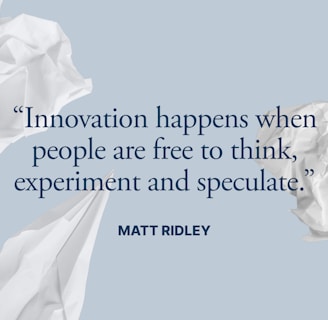The Power of Innovation in the Workplace
In our second blog post on innovation in the workplace, we explore why innovation matters, the risks of ignoring it, and strategies to cultivate a dynamic and forward-thinking organisation based on recent research data.
2 min read


The Power of Innovation in the Workplace
Innovation is the driving force behind organisational success, ensuring businesses remain competitive, adaptable, and forward-thinking. Fostering a culture of innovation is not just beneficial—it is essential. Organisations that fail to innovate risk stagnation, disengaged employees, and an inability to keep pace with industry advancements.
Why Innovation Matters
Innovation enhances efficiency, boosts productivity, and promotes long-term growth. According to a 2022 McKinsey report, organisations that prioritise innovation outperform their competitors by 30% in revenue growth. Moreover, innovative workplaces tend to attract top talent, as employees seek dynamic environments where creativity is valued.
A lack of innovation, on the other hand, can lead to obsolescence. A report by PwC (2021) found that 80% of executives believe their business model is at risk of disruption. Companies that resist change often experience declining market relevance, higher employee turnover, and reduced customer loyalty.
The Risks of Ignoring Innovation
Failing to innovate has both immediate and long-term consequences:
- Loss of Competitive Edge – Companies that fail to adapt may struggle to compete with industry leaders who continuously evolve their offerings.
- Decreased Employee Engagement – A lack of innovation can lead to stagnation, leaving employees uninspired and unmotivated.
- Inefficiencies and Outdated Processes – Organisations that do not embrace new technologies risk operational inefficiencies that hinder productivity.
- Limited Growth Opportunities – Businesses that do not foster new ideas may miss opportunities to expand into emerging markets or attract new customers.
How to Cultivate Innovation
To create a culture that encourages innovation, organisations must take proactive steps:
1. Encourage a Growth Mindset
A study by Stanford University (Dweck, 2016) found that employees with a growth mindset—who see challenges as opportunities—are more innovative. Organisations should provide training and encourage continuous learning to foster this mentality.
2. Foster Psychological Safety
Google’s Project Aristotle (2016) revealed that psychological safety is the most important factor in high-performing teams. Employees should feel safe to share ideas without fear of criticism.
3. Invest in Technology and R&D
A Deloitte report (2022) states that 67% of businesses that invest in emerging technologies see a direct improvement in their bottom line. Allocating resources to research and development ensures companies stay ahead of industry trends.
4. Encourage Cross-Functional Collaboration
Teams with diverse perspectives drive innovation. MIT Sloan (2022) found that companies promoting cross-functional collaboration are 1.5 times more likely to develop breakthrough ideas.
5. Recognise and Reward Creativity
A study by Gallup (2021) found that employees who feel their contributions are valued are 44% more likely to be engaged. Acknowledging and rewarding innovation motivates employees to think creatively.
Sustaining Innovation for Employee Well-being
Innovation is not just about organisational success—it also plays a vital role in employee satisfaction and well-being. Workplaces that promote creativity tend to have higher job satisfaction rates, as employees feel more fulfilled when contributing to meaningful projects. Companies that allow employees to experiment, take calculated risks, and learn from failure create an environment where individuals thrive.
By continuously fostering innovation, businesses can remain resilient, adapt to change, and ensure long-term success while keeping employees engaged and motivated.
References
- Deloitte (2022). The Future of Innovation in Business.
- Dweck, C. (2016). Mindset: The New Psychology of Success. Stanford University.
- Gallup (2021). State of the Global Workplace Report.
- Google (2016). Project Aristotle: Understanding Team Effectiveness.
- McKinsey & Company (2022). The Business Case for Innovation.
- MIT Sloan (2022). The Role of Collaboration in Driving Innovation.
- PwC (2021). Disruptive Innovation in Business.
